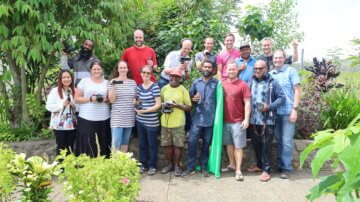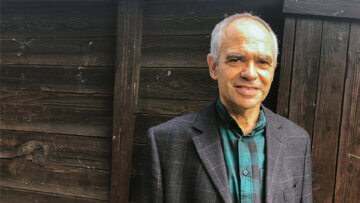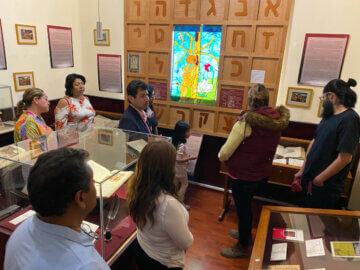Taking, and Passing, the Baton
Stephen Coertze looks back at a lifetime of preparation

Stephen Coertze
When Stephen Coertze was 8 years old, his Sunday school teacher asked the class: “If you had one wish, what would it be?”
A creative thinker even at that age, Stephen said he would wish for a magic wand.
“I reckoned I could then make all my wishes come true,” he recalls.
The teacher seemed surprised at the pastor’s son. She responded through tears: “Why don’t you rather wish that every person in the world can have a Bible in their language?”
Stephen quickly reasoned that his magic wand could handle this wish as well. But he always remembered the words from this South African farm wife.
“She lived a very simple life,” he says today. “And for her, at that stage in South Africa, when we were isolated from the rest of the world, to have a grasp of language communities across the globe without access to Scripture — that was mind-boggling. I grew up in the centre of the church life, with my dad exposed to what was happening across the denomination or across the globe, and he did not even have that exposure or understanding at that stage.
“So for this Sunday school teacher to say this ... It was really something significant that the Lord brought over my life at that stage.”
South Africa’s significance
Thus began Stephen’s lifelong, unique path to becoming Executive Director of the Wycliffe Global Alliance. Member of the South African Police during the waning days of apartheid. Pastor. Director of Wycliffe South Africa. And now, this new challenge.
Today Stephen thinks less about wielding a magic wand and more about passing a baton. His country’s geographic and cultural significance is never far from view.
“South Africa is a unique country,” he says. “Our whole existence has been a movement of God, even with the good and bad that has been associated with South Africa.”
Before the Suez Canal created a shortcut in the mid-19th century, South Africa was a halfway point for ships sailing from Western Europe to Asia. William Carey, often called the father of modern missions, stopped in Cape Town on his way to India in 1793. He described the outpost as “the uttermost parts of the earth,” a place where East and West converged. Carey proposed a global missions conference for 1810 in Cape Town. It didn’t happen, but 200 years later, the Third Lausanne Congress was held there — for much the same reason.
Pivotal moment
During his tenure with Wycliffe South Africa, Stephen attended ICON 2002, a joint meeting of Wycliffe Bible Translators and SIL International. One of the speakers was Andrew Walls, the British mission historian. Walls presented an academic paper, proposing that Christianity was dying off at its centre and growing at its periphery. The Western church, he said, needed to hand the baton of Christian moral leadership to leaders of the Majority World church.
No stranger to academic presentations, Stephen listened intently and critically. Then everything changed.
“All of a sudden it felt like a hammer blow between my eyes, a sharp light blinding me and a voice saying to me, You live in a country where both the church of the West and the global church exist. What are you going to do to hand over the baton?
Flabbergasted by the question, Stephen spent the next year thinking about it. He discussed resigning and advising the board to appoint a black South African as director. Neither he nor his board chair had peace or direction about the idea.
At a board retreat, he mentioned to Prof. Piet Meiring that he had no interest in further academic studies.
”If you want the church in Africa to take you seriously, you need a doctorate,” Meiring said.
The moment proved prophetic, not just for Stephen but also for the Alliance and SIL. The Ph.D. he earned helped set the missiological emphasis of the Alliance and SIL. It also paved the way for Alliance Director Kirk Franklin to pursue his own Ph.D., which helped define the Alliance’s future direction. Stephen eventually would move from the Wycliffe South Africa director position to missiological consultant with the Wycliffe Global Alliance.
By the time he stepped away from Wycliffe South Africa, the organisation had gone from being American-funded and directed to being mostly independent in funding, with a staff that is mostly African.
That baton handoff came into view for the entire Alliance.
“To see the reshaping of the structures from a linear institutional approach to an all-inclusive community in which every organisation can have equal opportunity and voice is exhilarating,” he says. “In hearing the multitude of diverse voices, we are grasping a fuller understanding of the image of God, and therefore, also a fuller understanding of ourselves.”

The Coertze family. Left to right: Stephen, Lezelle, Ivan and Natasha.
Family calling
Stephen and his wife, Lezelle, will celebrate their 30th wedding anniversary in 2020. Early in their marriage they committed to serving God full-time in mission, though they didn’t immediately know where and how. Eventually it led to Wycliffe South Africa.
“There was nothing rosy or mystic about our full-time mission encounter,” Stephen says. “It was hard slog, sweat and tears, and often more painful than uplifting. But that was our context for 14 years. Again, among the tears, numerous lessons of faith, the Lord’s goodness, mercy, and his presence in our lives in this time are carved in our memories.”
Input from Lezelle and their two adult children was central to Stephen’s decision to apply for the Global Alliance role. Natasha, 27, and Ivan, 23, both live at home and the family is close.
“Lezelle was the first one out of the blocks to encourage me to pursue this role,” Stephen says. “We had numerous and long discussions in processing various aspects of how this role would impact us as a family. Her encouragement has not wavered.”
Lezelle serves as a counselor at a school for severely intellectually disabled children. Natasha holds a master’s degree in psycholinguistics. Currently she works as a music teacher and plays violin in a symphonic orchestra. Ivan is pursuing a master’s degree in forensic sciences, specifically related to entomology.
The family’s home is usually filled with classical and Christian music … along with a menagerie of pets: a German shepherd dog, two parrots, a tortoise (Nathasha’s) and two very large spiders (Ivan’s).
They worship at Rosebank Union Church in Sandton, a northern suburb of Johannesburg.
Everyone means everyone
Stephen often thinks back to that Sunday school moment when Bible translation first came to his attention. His teacher later became one of his and Lezelle’s first financial partners in their Wycliffe work. Years after her death, they still receive $20 US each month from her estate.
In a way, he has come full circle just as Bible translation is coming full circle. A true global picture might mean not only handing off the baton to the global church, but also re-engaging the Western church. No one sits on the sidelines anymore.
“It is not only a non-Western church thing,” he says. “This is a global ministry that includes the whole body of Christ.”
Article by Jim Killam, Wycliffe Global Alliance
Alliance organisations may download the images from this story.
The latest
View all articles
Informing, teaching, inspiring: PNG workshop teaches video storytelling for language communities
PNG workshop teaches video storytelling for language communities
Read more
Looking ahead at 2024
As the year unfolds, we marvel at the work of God in our rapidly changing world. And, we look forward to a number of gatherings and conversations intended to draw us together.
Read more
Telling the Bible's Story
It may come as a surprise that a museum is among the Wycliffe Global Alliance organisations.
Read more